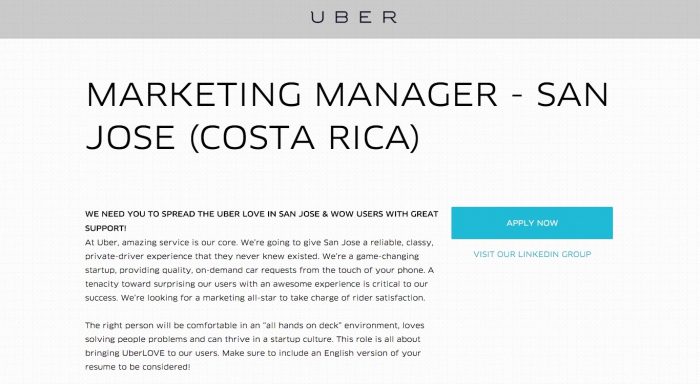Taxistas protestan en barrio Dent contra aplicación UBER http://t.co/1xUy1VmcZf #TN7 pic.twitter.com/KzJ64XmJ8z
— Telenoticias (@Telenoticias7) July 29, 2015
Taxi drivers in San José demonstrated in front of the Colombian Embassy in a sign of solidarity with taxi associations in Mexico City and Colombia protesting the ride-sharing service Uber on Wednesday. Demonstrations were peaceful in Costa Rica and Colombia but violence flared in Mexico City when taxis attacked Uber drivers at Toluca International Airport.
The National Forum of Taxi Drivers announced an alliance last week with other taxi associations in Central America and Colombia to “declare war” on the disruptive ride-sharing app, reported Mexico’s El Universal newspaper. Protesters in Costa Rica drove their iconic red taxis in phalanx to the Dent neighborhood in San José and carried signs reading “No Uber” and “Uber Out.”
Uber does not currently operate in Costa Rica but does have operations in Mexico City, Panama, Colombia and Chile, among other Latin American countries.

Rumors have swirled about the impending arrival of Uber in Costa Rica after the company quietly posted job positions in English in San José, including a Marketing Manager.
The Tico Times contacted the San Francisco-based company for comment about opening operations here but did not receive a response by press time. Any response will be published in an update here.
The demonstration lasted roughly an hour as protesters presented a letter to the diplomatic mission in solidarity with taxis demonstrating across Colombia including the capital, Bogotá.
Looks like taxi drivers in #Colombia are also demonstrating against Uber today. http://t.co/N3xjOvVi7B pic.twitter.com/RcLSORAdnR via @Foro_TV
— reported.ly (@reportedly) July 29, 2015
Gilbert Ureña, a spokesman for the National Forum of Taxi Drivers, told Costa Rica’s TV Channel 7 News that the service is “dangerous” because it does not offer insurance and threatens the jobs of traditional taxi services.
The Uber mobile app allows users to call private cars, including luxury vehicles, from their smartphones after entering credit card information. Customers do not pay the driver directly, but rather fares are deducted from a user’s account. Uber drivers use the GPS coordinates of the caller’s phone to pick them up.
The company could have a valuation of $50 billion if it goes public, The New York Times reported in March.
The Costa Rican newspaper La República reported that Uber could quickly start operations in Costa Rica by partnering with existing cab companies.
Demonstrations were reportedly peaceful in Colombia and Costa Rica, but violence broke out when at least 10 Uber vehicles were attacked by taxi drivers at the Mexico City airport.
"Violence against Uber is unjustifiable." – Rocío Paniagua (@Uber_DF) http://t.co/urMR3OgkNT pic.twitter.com/3MZhkRXMzI v @Comunidad_Exc
— reported.ly (@reportedly) July 29, 2015
Uber’s Mexico City office published a brief statement calling the violence “unjustifiable.”
There are no ride-share apps in Costa Rica, but mobile apps like Tico Taxi and Easy Taxi allow users to call formal cabs from their smartphones with GPS coordinates.
AFP contributed to this report.





